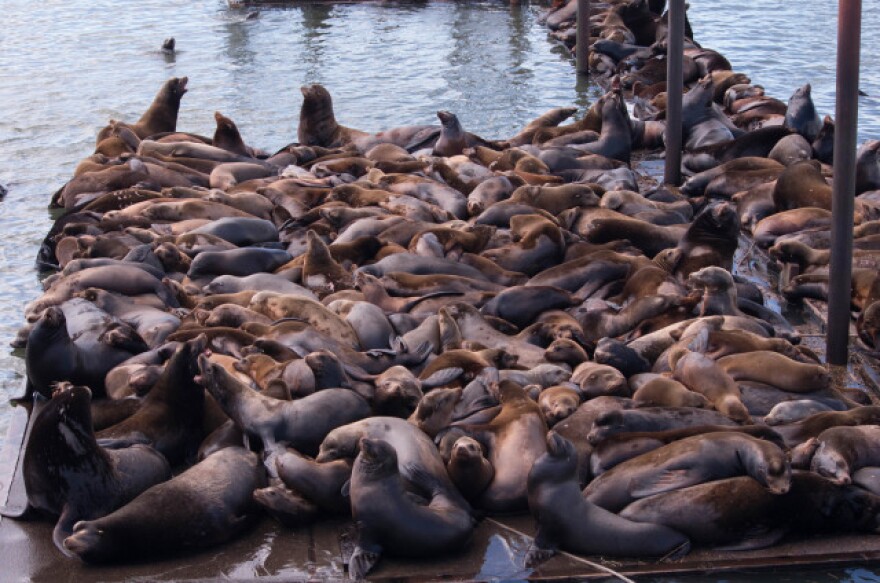A record number of sea lions have been feeding in the Columbia River this spring. A lack of food in the ocean and a big run of smelt drew them in. And now they’re eating salmon. That has a lot of people debating the best way to manage these hulking pinnipeds. While some are shooting at them, and arguing for their lethal removal, others are rushing to their defense.
In Astoria's East Mooring Basin, big blubbery sea lions have taken over the docks that are supposed to harbor boats. Bill Hunsinger oversees those docks as a commissioner with the Port of Astoria.
Hunsinger: “You can't bring people down to these docks when you've got this type of situation."
This spring, more than two thousand barking sea lions piled into the marina – astonishing biologists who have been monitoring them here for years. Hunsinger says the sea lions are sinking people's boats, disturbing nearby hotel guests and even biting people and their dogs. And that's on top of all prized spring salmon they're eating – at times plucking them right off the lines of recreational anglers.
Hunsinger: 9:37 "Talked to three guys went fishing two weekends ago. Had nine fish on and never got one to the boat. Lost 'em all to sea lions."
Biologists say the sea lion population is as big as it's ever been. Managers have killed about 70 sea lions in the Columbia to protect threatened and endangered salmon. But Hunsinger says they should be killing more. And he's not the only one.

Begay: "Right there, Russ. Go ahead. Roll one."
146 miles up the Columbia River, members of Native American tribes are in a boat chasing down sea lions and shooting non-lethal firecrackers at them.
Begay: "Go ahead, Russ."
Yakima Nation member Bobby Begay gives shooter Russell Jackson the green light to fire. Then he lights the fuse of a bigger noise-maker called a seal bomb and tosses it into the river.
(Sound of seal bomb)
Their job is to keep sea lions from eating salmon at Bonneville Dam – the first bottleneck for fish on the river. As thousands of salmon and steelhead swim back to their spawning grounds to reproduce, this dam slows them down and makes them easy pickings for sea lions.
Doug Hatch is a fisheries biologist for four Columbia River tribes. He says these non-lethal tactics can only do so much to protect the fish from sea lions.
Hicks: "For the times that we're hazing, it's pretty effective. But as soon as we leave the animals will come back."
A federal study last year tracked adult salmon from the mouth of the Columbia to Bonneville Dam. 45 percent of the fish went inexplicably missing somewhere along the way.
Hicks: "The smoking gun is sea lions. Sea lion abundance has increased tremendously over the past several years."
The Marine Mammal Protection Act says you can’t just shoot sea lions to protect fish. So the tribes are hoping to get authorization from Congress to legally kill more sea lions. But to animal lovers like Nannette Jones, killing any sea lions at all is crazy.
Jones: "Sea lions are beautiful, amazing animals, and we have just been blown away by the outpouring of support for these animals."
Jones leads the Sea Lion Defense Brigade. Members take turns watching over sea lions in Astoria and at Bonneville Dam. She says killing sea lions won't save the salmon.
Jones: The salmon populations were going extinct when there were no sea lions in the river back in the 80s. So to draw the connection that the sea lions are causing the extinction of salmon it's basically scapegoating."
Back in Astoria, Bill Hunsinger doesn't disagree with Jones that the animals are beautiful.
Hunsinger: "Well, they are, and they're entertaining, but they need to go entertain somebody else in someplace else."
Many sea lions will leave the river soon for their breeding grounds farther south. But there's little doubt they'll be back – barking and eating fish again – next spring.
Copyright 2015 Earthfix



